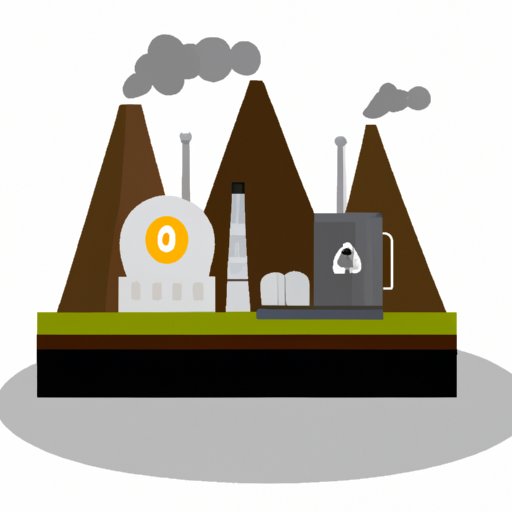Introduction
Fossil fuels are a type of energy resource composed of hydrocarbons, derived from ancient organic matter such as plants and animals. They are an important part of our everyday lives, providing us with the energy we need to power our homes, businesses, and transportation. However, there are significant environmental and economic costs associated with the production and use of fossil fuels, which can have long-term consequences for the planet and its inhabitants.

Examining the Process of Extracting Fossil Fuels
The process of extracting fossil fuels is complex and involves a variety of methods. Depending on the type of fuel being extracted, different techniques may be used. For example, coal is usually mined using deep underground shafts or large open pits, while oil and natural gas are typically extracted through drilling. Regardless of the type of extraction method used, there are significant environmental impacts associated with the process.
The environmental impacts of fossil fuel extraction include air and water pollution, increased greenhouse gas emissions, and deforestation. Additionally, the process of extracting fossil fuels can disrupt wildlife habitats and reduce biodiversity. This can have a negative effect on the local ecology and lead to a decrease in species diversity.
Exploring the Impact of Fossil Fuel Consumption on the Environment
In addition to the environmental impacts of extraction, the burning of fossil fuels also contributes to air and water pollution, as well as the emission of harmful greenhouse gases. These gases trap heat in the atmosphere and contribute to global warming, leading to rising sea levels, extreme weather events, and other climate-related problems. Moreover, the burning of fossil fuels can lead to smog, acid rain, and other forms of air pollution, which can have a negative effect on human health and the environment.
The burning of fossil fuels also contributes to deforestation, as land is cleared to make way for new energy sources. This can result in a loss of habitat for many species and an overall reduction in biodiversity. In addition, the production of fossil fuels has been linked to water contamination, as runoff from mining sites can contaminate nearby water sources.
Analyzing the Pros and Cons of Using Fossil Fuels
Despite the environmental concerns associated with the use of fossil fuels, they still remain an important part of our lives due to their affordability and abundance. Fossil fuels are relatively inexpensive and easy to access, making them a viable option for many people and businesses. Additionally, they are a reliable source of energy that can be used to generate electricity and power transportation, as well as provide heat and light.
However, there are several drawbacks associated with the use of fossil fuels. Burning these fuels releases a variety of pollutants into the atmosphere, which can cause health problems and damage the environment. Additionally, the production of fossil fuels is non-renewable, meaning that the resources will eventually run out, leading to higher prices and increased reliance on alternative energy sources.

Investigating the Economics of Fossil Fuel Production
The cost of extracting and producing fossil fuels varies depending on the type of fuel and the location of the site. Generally, coal is the cheapest to produce, followed by oil and then natural gas. Additionally, the cost of production can be affected by taxes, subsidies, and other government regulations.
The profitability of fossil fuel production also depends on market conditions and the availability of alternative energy sources. When demand is high and prices are low, fossil fuel companies can make a profit. However, when demand is low and prices are high, it can be difficult for companies to make money.

Understanding the Different Types of Fossil Fuels and Their Uses
There are three main types of fossil fuels: coal, oil, and natural gas. Coal is a solid fuel that is primarily used in the generation of electricity. Oil is a liquid fuel that is used to power vehicles, ships, and airplanes. Natural gas is a gaseous fuel that is used to generate electricity, heat homes, and cook food.
Each type of fossil fuel has its own advantages and disadvantages. Coal is relatively inexpensive and widely available, but its use can be damaging to the environment due to its high levels of carbon dioxide emissions. Oil is more efficient than coal, but it is also more expensive and can be difficult to transport. Natural gas is cleaner than coal and oil, but it is also more volatile and can be difficult to store.
Conclusion
Fossil fuels play an important role in our lives, providing us with the energy we need to power our homes, businesses, and transportation. However, the production and use of fossil fuels can have significant environmental and economic costs. The extraction process can lead to air and water pollution, increased greenhouse gas emissions, and deforestation, while the burning of these fuels can have a negative effect on human health. Additionally, the cost of production and the availability of alternative energy sources can affect the profitability of fossil fuel production.
Finally, understanding the different types of fossil fuels and their uses is essential. Coal is primarily used in the generation of electricity, while oil is used to power vehicles, ships, and airplanes. Natural gas is used to generate electricity, heat homes, and cook food. Each type of fossil fuel has its own advantages and disadvantages, and it is important to consider all of these factors when deciding how to use these resources.
Overall, fossil fuels are an important part of our lives, but their production and use can have significant environmental and economic costs. It is important to understand the process of extracting and consuming these fuels and to consider the potential impacts they may have on the environment before making any decisions about their use.
(Note: Is this article not meeting your expectations? Do you have knowledge or insights to share? Unlock new opportunities and expand your reach by joining our authors team. Click Registration to join us and share your expertise with our readers.)
